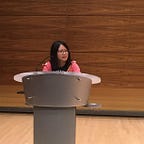Brave, Not Perfect
In celebration of women’s history month, the company I work for scheduled a series of events, inviting exceptional female leaders from diverse backgrounds to speak with us.
In this article, I’m going to focus on the event featuring Reshma Saujani.
— founder of Girls Who Code, author of Brave, Not Perfect.
Teach girls to be brave and take risks in life
Naturally, the moderator asked questions about her inspiring Ted talk.
She mentioned during the years she ran “girls who code”, they noticed that girls have the tendency of not showing their work to others if it’s not perfect (i.e. the correct answer), so when they can’t solve a programming problem, they rather just leave the coding pad blank, and tell the instructors, “I don’t know.” However, if you hit the back buttons a few times, you could actually see that they did try to solve the problem, but are somehow ashamed to let others know “I tried but failed.”
The idea of “perfection” is imposed upon and expected of women, and this goes way back to how girls are brought up by their family.
If you go to a playground near your house, it’s easy to see how parents treat their girls and boys differently. They let the boys freely roam the playground, encourage them to try things. If the boys fell or hurt themselves, we tell them “it’s okay — don’t cry”. We told them to “tough it out and try again”. For the girls, the parents are less likely to let them run freely on the playground. When girls get hurt, we give them extra attention, and we don’t tell them to tough it out nor encourage them to try again.
“Somehow, we feel the need to both physically and emotionally protect our girls.”
My theory is that, this is just another phenomenon of how patriarchy is deeply rooted in our society. In the patriarchal system, women are considered weak and the one to be protected.
Because we teach girls to be perfect instead of being brave, women are missing out on opportunities in life. How do you reach your greatest potential if you don’t try and fail as much as you can?
We’ve all heard of the old saying, “fortune favors the bold,” and it is still very true and applicable in today’s world.
It’s widely known that women are underrepresented in many parts of our society (e.g. the workforce). If we start teaching women to be brave, perhaps the gap in representation would be closed sooner.
Women are still doing most of the unpaid work for our economy
Throughout the pandemic, data has shown that women are “voluntarily” quitting their jobs and leaving the workforce as a result of school being closed and limited child care options. Reshma gave a great deal of thoughts into this, and realized that —
“Simply telling women to lean in, be brave etc. isn’t enough.”
Historically, women are the one who did most, if not all the unpaid work — ranging from child care, cleaning the house, to taking care of sick family members etc. Today, most of these burdens are still on women, so you can imagine how hard it is for the working women to keep doing their daytime job on top of all these “responsibilities at home”. It has been difficult even before the pandemic, but the pandemic really pushes a lot of working women to the brink, and thus quitting the paid job.
Concerned that the gender gap in workforce would take a lot longer to recover to pre-pandemic level, Reshma founded a new organization — Marshall Plan for Moms, to advocate for policies that would help and support women in rejoining the workforce. She also released a new book Pay Up: The Future of Women and Work on how we can all work together to lift the burdens of unpaid work off the shoulders of working women. I’ve yet to read this book but are eager to learn what wisdom and advice she would offer in the new book.
